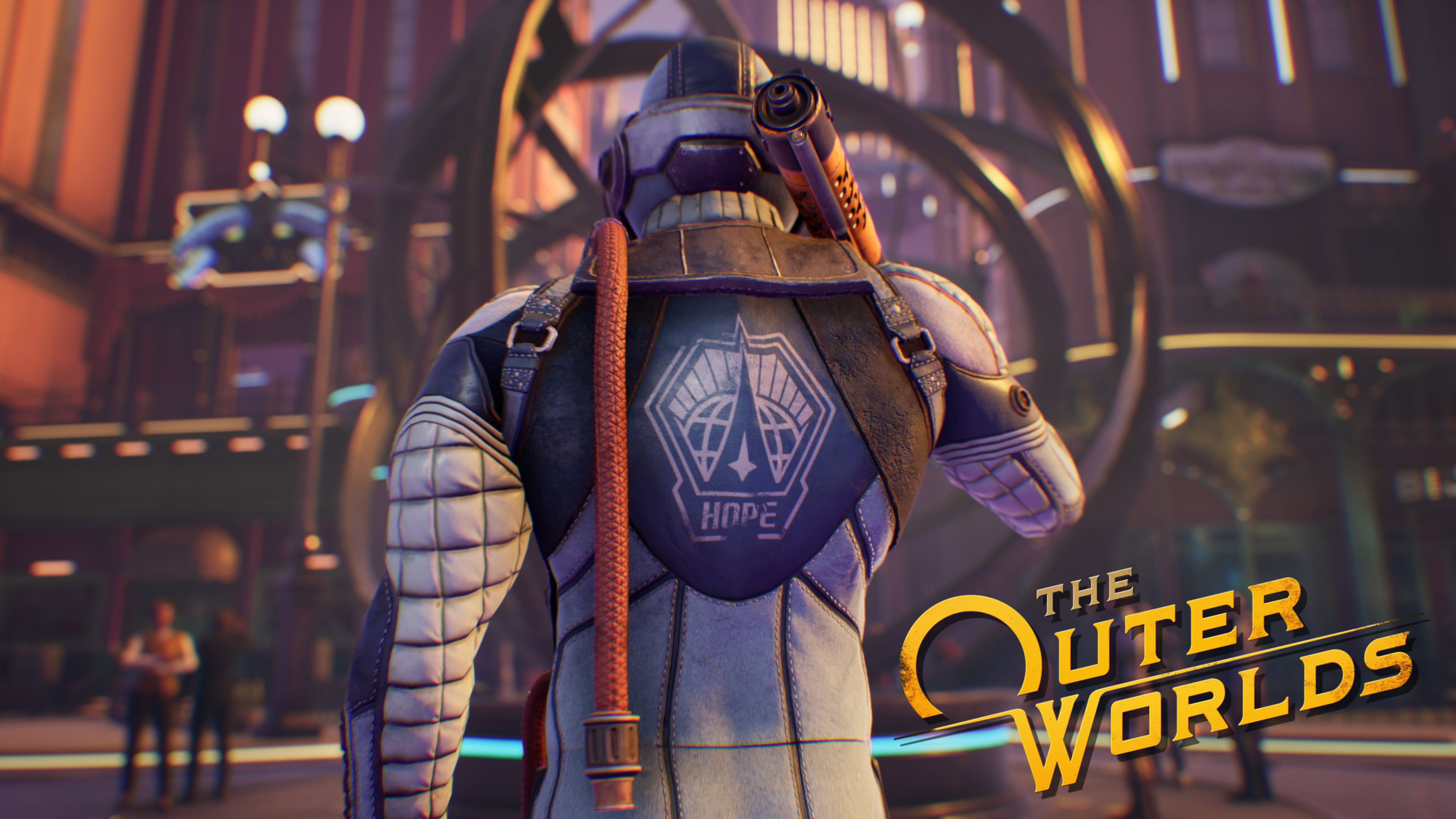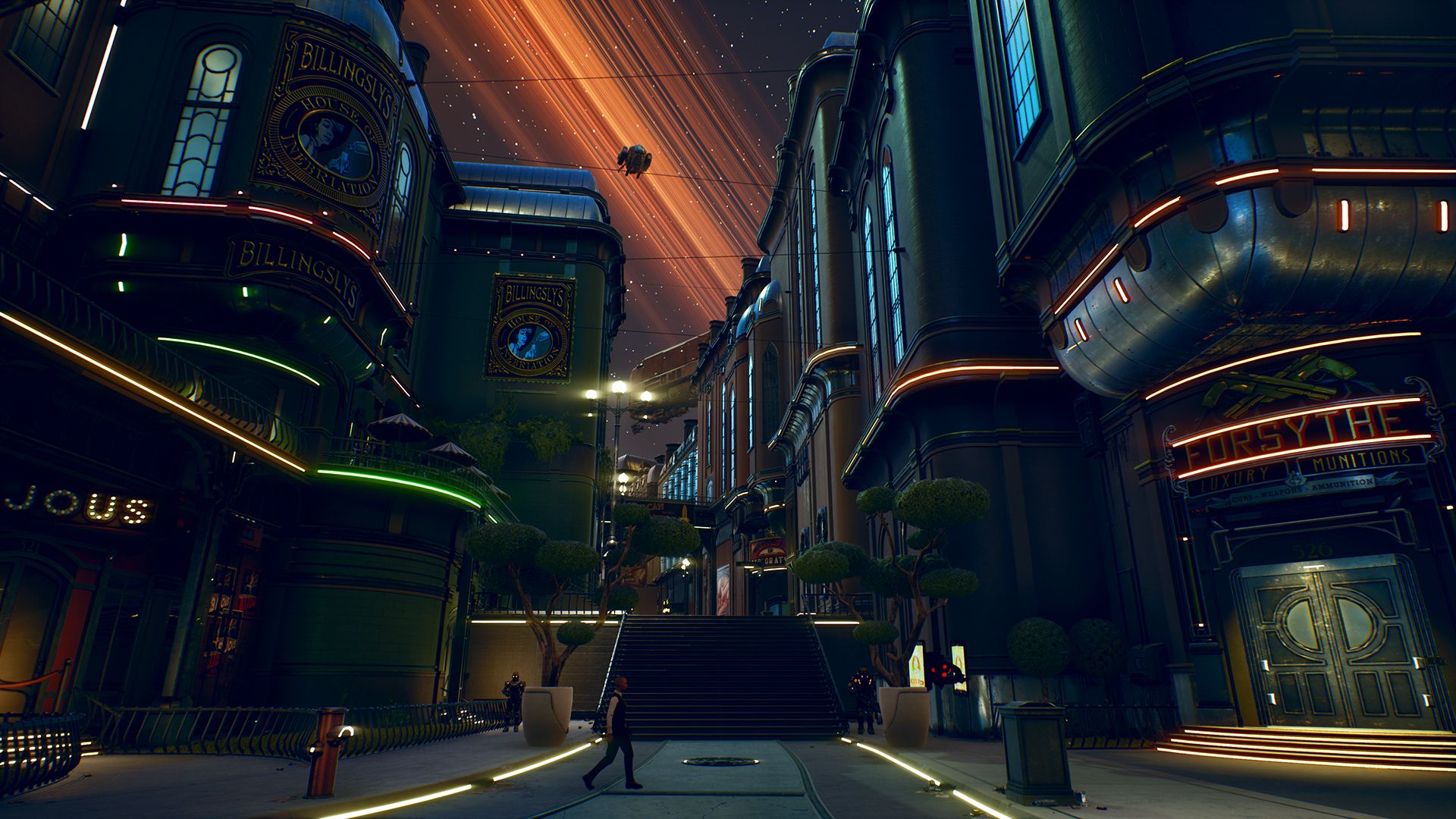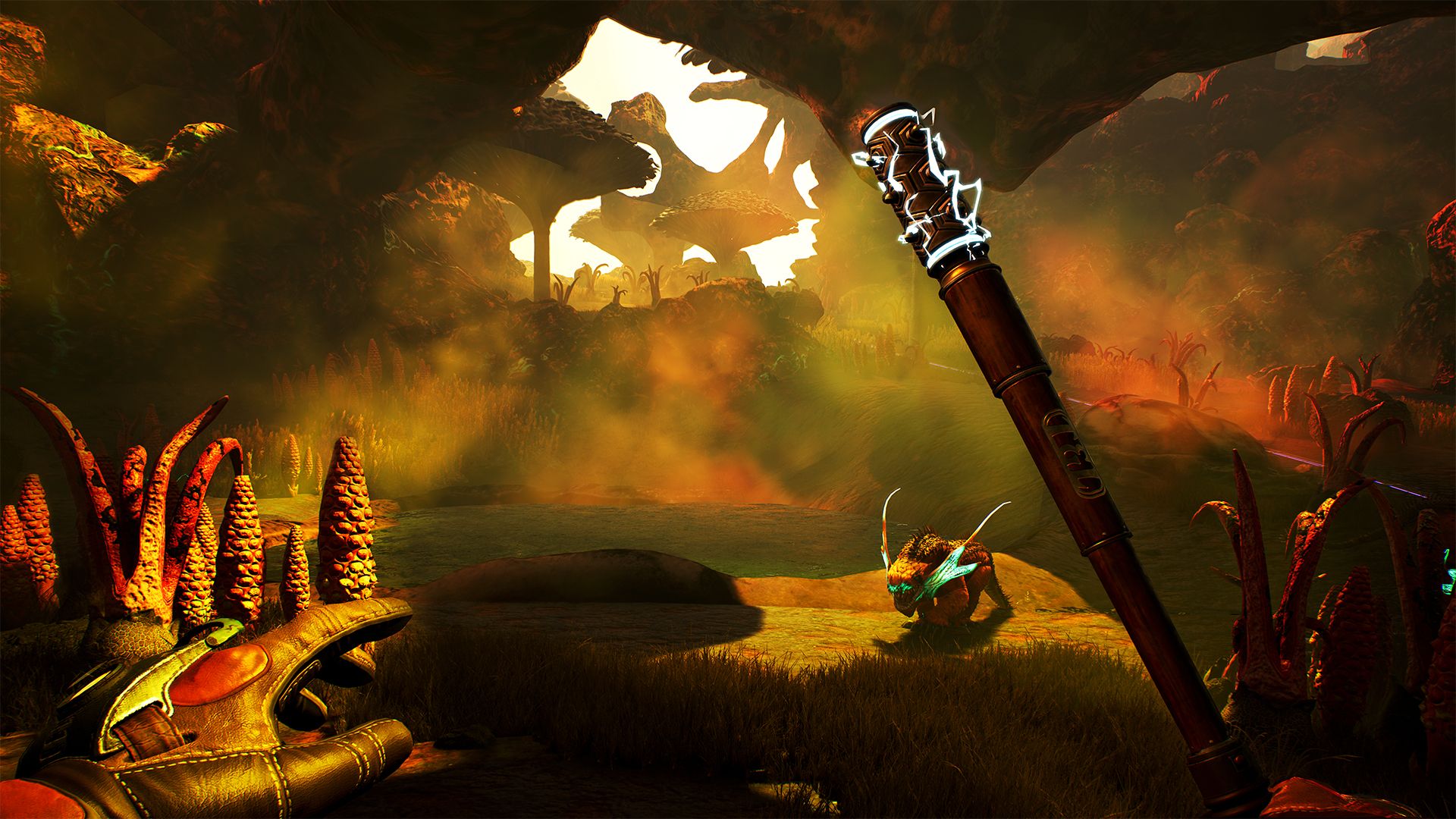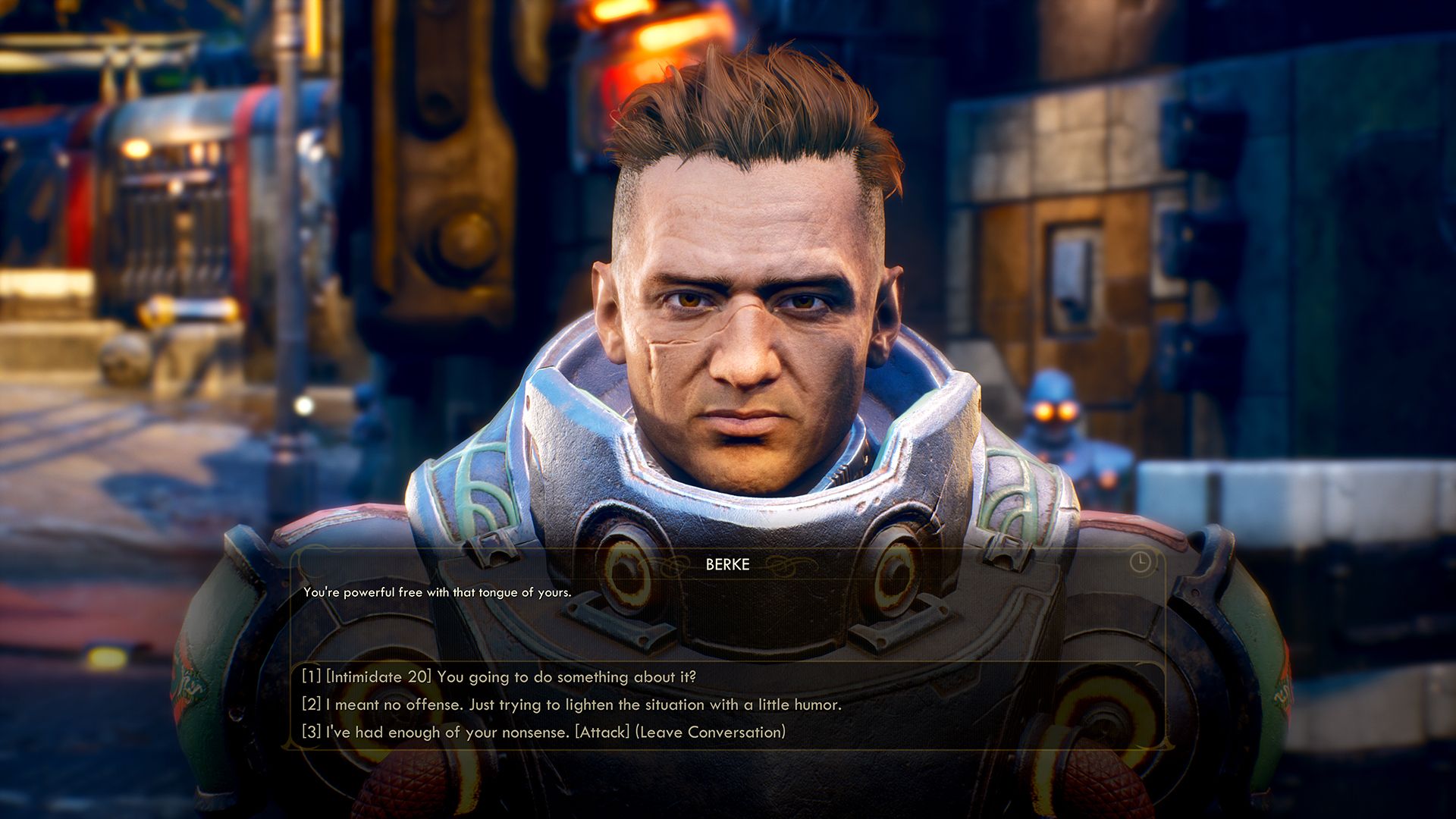Obsidian's The Outer Worlds is one of the most intriguing and exciting releases of 2019. Led by some of the creators of the original Fallout, The Outer Worlds is one of the first true single-player RPGs that we've seen in quite a bit, separate from the mold of games-as-a-service or other multiplayer factors. The Outer Worlds seems to be exactly the kind of game that many single-player RPG enthusiasts have been wanting to see again for years.
Following The Outer Worlds' panel last weekend at PAX East, I had the opportunity to sit down with the game's Co-Directors Tim Cain and Leonard Boyarsky and talk about their latest venture. Over the course of our discussion, we chatted about Fallout's influence on the design and world of The Outer Worlds as well as getting into the nitty-gritty with some of the game's more unique RPG systems.
Logan: I find Obsidian to be really unique because you all are constantly switching genres it seems with almost every project you make. From first-person games like Fallout: New Vegas and The Outer Worlds to turn-based projects like South Park: The Stick of Truth, is it hard to constantly be switching things up and not sticking within one genre structure for too long? And does that ever lead to trouble during development?
Leonard Boyarsky: Well I would consider them all role-playing games, to a certain degree or another. I think it's just what the game asks for. Tim could tell you about how they ended up with the combat in South Park becoming turn-based. Obviously, this is before our time [at Obsidian] but when they're making sequels to established games, that's already set up. It's kind of like each game demands it's own thing. We wanted to make something that was kind of a spiritual successor to Fallout: New Vegas or that style of game and if you're going to do that then it has to be first-person.
L: So you mention Fallout: New Vegas here directly and I think the thing that has stood out to me the most so far about The Outer Worlds is how similar it is to Fallout. Not even in just the general RPG structure but more so the world and how it's presented with all of the ads for various products scattered about and how characters within the world talk to one another. Is this all very intentional and trying to embrace those similarities to Fallout as much as possible?
Tim Cain: Well in a sense what I've told people is that's just my humor. The fact that it came out in Fallout, it also came out in Arcanum, it's also going to come out in this game. We have a lot of people on the team who worked on Fallout 1, 2, or New Vegas, so that's just kind of in their DNA too.
[pullquote]"We wanted to make something that was kind of a spiritual successor to Fallout: New Vegas."[/pullquote]
LB: We have the opposite problem of other people who would try to make a Fallout-style game. We have to continually go, "Oh, wait, is that too much Fallout?" When we made Fallout there was nothing. There were no guidelines, there was just whatever we wanted to make so it was really just following our guts. We're back in that position now with this game and we're following our guts and every once in awhile we go, "Well, maybe we want to take it in a little bit different of a direction because this is feeling a little too much like Fallout." It's an interesting position to be in and be doing something that feels very much like something you've made before but then having to steer clear of it because now somebody else owns that thing. It's a very weird headspace sometimes.
L: Is it strange that you are also now taking a bit of inspiration and influence from your original work on Fallout when you know that so many other developers across the industry have been doing the same thing for over two decades?
LB: I've seen things that people have done where I'm like, "Wow, I'm pretty sure they were inspired by Fallout." If other people can be inspired by Fallout, I think we can be inspired by Fallout too. [laughs]
TC: As I told someone else, I don't think you can plagiarize from yourself. This is just our style, so if it looks familiar, this is just what we do.
L: You mentioned this a bit in the panel Tim, but the brands and advertisements that are scattered throughout The Outer Worlds, do those all stem from you directly to a certain degree?
TC: It's really a blend. When Leonard was talking about it in the meeting, the first thing we talked about was setting. Once we had the setting, Leonard kind of went off and I tended to system mechanics that fit in that setting. The whole thing in that trailer what we really wanted to tell people was that if you like Fallout, especially the original ones and New Vegas, this is what you're going to like. We're trying to set people's expectations.
LB: Yeah, the cool thing about Tim tackling a lot of the brand stuff is that he can just write all that stuff off all day long -- the funny taglines, the over-the-top silly stuff. To me, I feel like the best stuff is where we combine on that but that was an area where we just went for that over-the-top silliness.
TC: That was very indulgent. [laughs]
L: You showed off a bit more of the companions you can have in The Outer Worlds today during the panel and it really reminded me the most of the Knights of the Old Republic games. One thing I really liked about those games was that your companions would start pushing back against you at times if they didn't like the direction you were taking things. Will that be something that might happen in The Outer Worlds?
LB: There are story spots where that happens. We had a morale system designed but we never actually were able to implement it just because of our time constraints and budget constraints. What we decided to do instead was based on their personalities and their characters--who they are as people--that if you do this, then this companion is really going to have a problem with that. But it shouldn't come as a surprise.
TC: Plus they all hang out on the ship. If you go back to the ship and you've done something that one of them really hates, they'll go, "Hey, I really need to talk to you." Then when you talk to them they might be like, "I can't believe you did that, I'm really not happy with you." They'll warn you once, but if you continue to do things like that then they might tap out.
L: The flaws system is something else you both touched on a bit today during the panel and it's something that I find fascinating. Is it weird designing a system though that players can so easily opt-out of ever even utilizing?
TC: I know I say this a lot, but I'm a huge fan of Joseph Campbell. If you read his book The Power of Myth or you watch the PBS special, he makes a big point about how heroes aren't these perfect people. Every RPG now you start weak and then you become a god. And I'm like, that's not the interesting thing!
I've been working out different designs for like twenty years and I never figured out how to do it. What clicked in my head was that we're monitoring so much stuff in the game for achievements anyway, you can leverage that system. It knows how much damage you've taken of all these different types and it knows where you were when you took the damage and what type of damage it was. Why not track that and put thresholds in the game?
When you pass that threshold, just suggest, "Hey, you really like smoking these cigarettes. Do you want an addiction to them?" If you do, you get another perk and people love perks so it's kind of like dangling the carrot. That was the thing that made it all click. And because it's completely optional, no one can complain because you can just go, "No, I don't want any flaws," and just play the game like you would any other game where at the end you're this perfect, flawless person. But I think it's more fun if you're flawed.
LB: As to the other part of the question about whether or not it's hard to make stuff players aren't going to use or see, that's kind of the core of what we make. If you never try a toxin, you're never going to see that content. If you don't choose one of the companions, you're going to miss out on all of the content that has to do with them. By the very nature of doing an RPG where we let you, within reason, do whatever you want to do, there's going to be things you choose not to do.
[pullquote]"Whether or not it's hard to make stuff players aren't going to use or see, that's kind of the core of what we make."[/pullquote]
L: Do you expect most people to take the flaws?
TC: I hope they do. I think they will.
L: I mean, I know I will.
TC: One of the first questions people always ask is if it's optional so at first, I thought people weren't going to do it. Also, it'll just keep asking you. If you say no you don't want to be phobic to canids, then it'll say, "Do you want to be afraid of the dark? Do you want to have a fear of heights? Do you want to be addicted to cigarettes?" Finally, you're like, fine, I'll do that.
L: Let's touch on side-quests for a moment. How much will quests that you do outside of the main path then have an effect on what transpires during the main quests? Or will there be little-to-no crossover between what you do on the side with the main plot?
LB: We try to periodically reference things you've done in the game. It doesn't necessarily skew it tremendously. There are a couple of spots in the game where things you've done in other places has an influence, but overall, they are kind of separate. We try to make it feel like the world is reactive to you doing those things so it's not like it's taking place in a vacuum, but it doesn't send it off veering in a completely different direction, if that makes sense.
L: I was interested in hearing what you both think about Stadia, Google's new streaming platform, since you've both been in the industry for so long. What were some of your general thoughts on what they've shown off so far of the technology?
TC: I think something like that is inevitable [but] I’m curious if we’re there yet.
LB: I just remember people tried to do online gaming before it was time for it. People tried to do things on the Internet just in general and everything crashed and burned. Five years later, everyone is doing it. Streaming, I remember when they first came out with streaming instead of getting Netflix discs in the mail and I was like, "Yeah, right. I’m going to watch this movie that’s buffering constantly?" Like Tim said, [streaming] will happen, it’s just who knows if it’s the right time yet.
L: Are you guys as developers excited for that to technology to come about or do you embrace it hesitantly?
LB: If you basically have a super PC somewhere that runs just as good as if it were in your house that means that we don’t have to worry so much about lower end systems. If it’s cheap enough and everybody can do that, then people aren't kept from playing your game just because they don’t have the best and the latest console or the best and the latest PC.
L: I also have to ask about Vampire: The Masquerade -- Bloodlines 2 for just a moment since the sequel was just announced. Were either of you at any point consulted or asked about the project at any point? And when did you first find out it was being made?
LB: We heard rumors about it for a while but we haven't talked to anyone who is working on it, really.
L: Is there anything else about The Outer Worlds that you haven't talked much about that you'd like to touch on?
LB: I feel like this is a weird, unique place to be in that I don't feel like there's a lot of stuff that we want people to know about that we haven't talked about that people don't know about.
TC: I don't see a whole lot of single-player RPGs come down. Usually, there are multiplayer or multiplayer components that factors into it. I just like that this is a pure single-player experience. Play at your own pace, play the kind of character you want, replay it and see how it varies. I just love that.
The Outer Worlds is slated to release later in 2019 on Xbox One, PS4, and PC via the Epic Games Store and Windows Store.




